#enslaving black people today
Text
instagram
#lovesexrelationships#fatherhood#love self#parenting#self love#i love it#blacklove#energy work#protect black women#meditation#enslaving black people today#true american history#i love being black#black consciousness#black truth#black community#black politics#black history#black is beautiful#black is sexy#black people made America 🇺🇸#Instagram
2 notes
·
View notes
Text
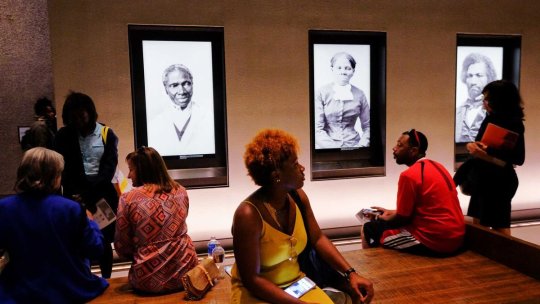
The portraits of Sojourner Truth, Harriet Tubman, and Frederick Douglass hang on the walls of the Smithsonian Institution’s National Museum of African American History and Culture on September 24, 2016, in Washington, DC
In August 1619, the first ship with “20 and odd” enslaved Africans arrived on the shores of Virginia. Four hundred years later, we look back at this moment as the start of an enduring relationship between the founding of the United States and the unconscionable exploitation of the enslaved.
In a sweeping project published by the New York Times Magazine in August 2019 exploring the legacy of slavery, Nikole Hannah-Jones wrote, “[The enslaved] and their descendants transformed the lands to which they’d been brought into some of the most successful colonies in the British Empire. ... But it would be historically inaccurate to reduce the contributions of black people to the vast material wealth created by our bondage. Black Americans have also been, and continue to be, foundational to the idea of American freedom.”
Yet centuries later, the lasting impact of slavery continues to be minimized and myths continue to flourish. For instance, there’s the erasure of the many slave revolts and rebellions that happened throughout the nation, perpetuating the lie that the enslaved were docile or satisfied with their conditions. There’s also the persistent idea that black labor exploitation is over, when mass incarceration still keeps millions of black Americans behind bars and often working for “wages” that amount to less than $1 an hour. Then there’s the idea that our understanding of slavery is accurate based on what we learned in history textbooks, when in reality, misinformation continues to be taught in our public schools about slavery’s legacy.
To unpack what often gets mistold or misunderstood, we asked five historians to debunk the biggest myths about slavery. Here’s what they said, in their own words.
1) The myth that slaves never rebelled
Miseducation surrounding slavery in the US has led to an elaborate mythology of half truths and missing information. One key piece of missing history concerns slave revolts: Few history books or popular media portrayals of the trans-Atlantic slave trade discuss the many slave rebellions that occurred throughout America’s early history.
C.L.R. James’s A History of Pan African Revolt describes many small rebellions such as the Stono Plantation insurgence of September 1739 in the South Carolina colony, where a small group of enslaved Africans first killed two guards. Others joined them as they moved to nearby plantations, setting them afire and killing about two dozen enslavers, especially violent overseers. Nat Turner’s August 1831 uprising in Southampton, Virginia, where some 55 to 65 enslavers were killed and their plantations burned, serves as another example.

A country road follows the trail of Nat Turner’s 1831 slave rebellion in rural southeastern Virginia, June 5, 2010. On either side, farms were burned and slavers murdered as Nat Turner and his followers marched toward the town of Jerusalem, now renamed Courtland. Andrew Lichtenstein/Corbis via Getty Images
Enslaved Africans resisted and rebelled against individual slave holders and the system of slavery as a whole. Some slipped away secretly to learn to read. Many simply escaped. Others joined the abolitionist movements, wrote books, and gave lectures to the public about their experiences in captivity. And others led or participated in open combat against their captors.
Omitting or minimizing these stories of rebellion helps hide the violent and traumatic experiences enslaved Africans endured at the hands of enslavers, which prompted such revolts. If we are unaware of resistance, it is easier for us to believe the enslaved were happy, docile, or that their conditions were not inhumane. It then becomes easier to dismiss economic and epigenetic legacies of the transatlantic slave system.
Dale Allender is an associate professor at California State University, Sacramento.
2) The myth that house slaves had it better than field slaves
While physical labor in the fields was excruciating for the enslaved — clearing land, planting, and harvesting that often destroyed their bodies — that didn’t negate the physical and emotional violence enslaved women, and sometimes men and children, suffered at the hands of enslavers in their homes.
In fact, rape of black women by white enslavers was so prevalent that a 2016 study revealed 16.7 percent of African Americans’ ancestors can be traced back to Europe. One of the study’s authors concludes that the first African Americans to leave the South were those genetically related to the men who raped their mothers, grandmothers, and/or great-grandmothers. These were the enslaved African Americans within the closest proximity to and who spent the longest durations with white men: the ones who toiled in the houses of slave owners.
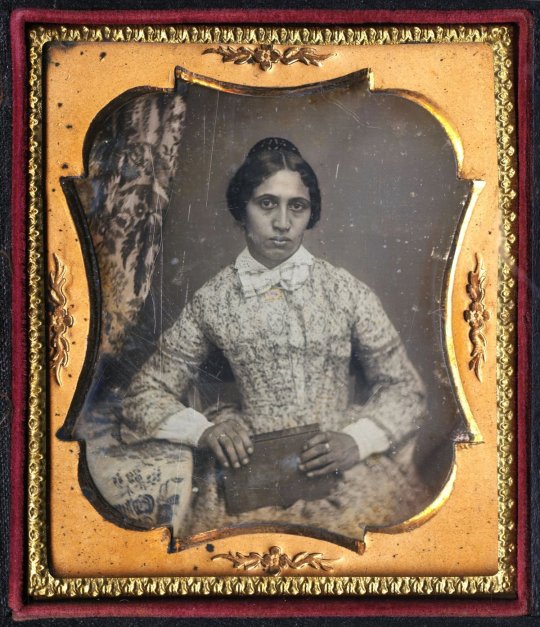
An unidentified woman poses with a book in her hands, circa 1850. The original caption identifies her only as a “freed slave.” Transcendental Graphics/Getty Images
A 2015 study determined that 50 percent of rape survivors develop PTSD. It is hard to imagine that enslaved and freedom-seeking African American survivors of rape — female, male, old, young, no matter their physical or mental abilities — did not experience further anxiety, fear, and shame associated with a condition they could not control in a situation out of control. Those African Americans with the most European ancestry, those tormented mentally, physically, emotionally, and genetically in the house, knew they had to get out. In fact, they fled the farthest — Southern whites are more closely related to blacks now living in the North than the South.
Jason Allen is a public historian and dialogue facilitator working at nonprofits, hospitals, and businesses in New York, New Jersey, and Philadelphia.
3) The myth that abolition was the end of racism
A common myth about American slavery is that when it ended, white supremacy or racism in America also ended.
Recently, Senate Majority Leader Mitch McConnell offered a familiar variant of this myth when he said he opposed reparations “for something that happened 150 years ago.” To the Kentucky Republican, a descendant of enslavers, slavery simply was, and then it just wasn’t, as though the battlefield had leveled the playing field when it came to race.
But the truth is that long after the Civil War, white Americans continue to carry the same set of white supremacist beliefs that governed their thoughts and actions during slavery and into the post-emancipation era.
In the South, especially, whites retained an enslaver’s mentality. They embraced sharecropping and convict leasing to control black labor in late 19th century, enacted Jim Crow laws to regulate black behavior in the early 20th century, and use racial terror to police the color line to this day.
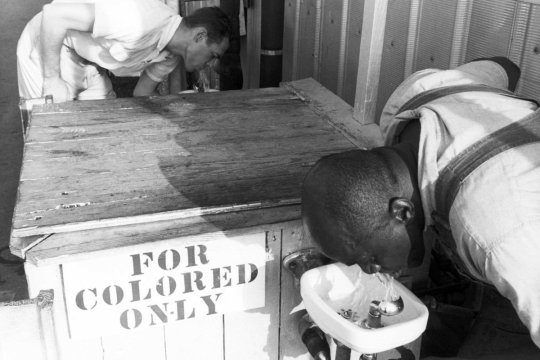
In this undated photo, two men use segregated drinking fountains in the American South. Getty Images
In the North, whites also rejected racial equality. After emancipation, they refused to make abandoned and confiscated land available to freedmen because they believed that African Americans would not work without white supervision. And when African Americans began fleeing Dixie during the Great Migration, white Northerners instituted their own brand of Jim Crow, segregating neighborhoods and refusing to hire black workers on a nondiscriminatory basis.
Slavery’s legacy is white supremacy. The ideology, which rationalized bondage for 250 years, has justified the discriminatory treatment of African Americans for the 150 years since the war ended. The belief that black people are less than white people has made segregated schools acceptable, mass incarceration possible, and police violence permissible.
This makes the myth that slavery had no lasting impact extremely consequential — denying the persistence and existence of white supremacy obscures the root causes of the problems that continue to plague African Americans. As a result, policymakers fixate on fixing black people instead of trying to undo the discriminatory systems and structures that have resulted in separate and unequal education, voter suppression, health disparities, and a wealth gap.
Something did “happen” 150 years ago: Slavery ended. But the institution’s influence on American racism and its continued impact on African Americans is still felt today.
Hasan Kwame Jeffries is an associate professor at Ohio State University.
4) The myth that history class taught us everything we needed to know about slavery
Many of us first learned about slavery in our middle or high school history classes, but some of us learned much earlier — in elementary school, through children’s books, or even Black History Month curriculum and programs. Unfortunately, we don’t always learn the entire story.
Most of us only learned partial truths about slavery in the United States. After the Civil War and Reconstruction, many in the North and South wanted to put an end to continuing tensions. But this wasn’t done just through the Compromise of 1877, when the federal government pulled the last troops out of the South; it was also done by suppressing the rights of black Americans and elevating the so-called “Lost Cause” of the enslavers.

The Tennessee-based group “New Confederate State of America” held a protest in support of retaining a statue of Confederate Gen. Robert E. Lee located on Monument Avenue in Richmond, Virginia, September 16, 2017. Win McNamee/Getty Images
The Lost Cause is a distorted version of Civil War history. In the decades after the war, a number of Southern historians began to write that slaveholders were noble and had the right to secede from the Union when the North wished to interfere with their way of life. Due to efforts by a group of Southern socialites known as the United Daughters of the Confederacy, Lost Cause ideology influenced history textbooks as well as books for children and adults. The accomplishments of black Americans involved in the abolition movement, such as Frances Ellen Watkins Harper, Maria W. Stewart, Henry Highland Garnet, and William Still, were downplayed. Union generals like Ulysses S. Grant were denigrated, as were anti-racist whites from John Brown to William Lloyd Garrison. Generations later, there are still many people around the country who believe the Civil War was about states’ rights and that slaves who had good masters were treated well.
Even an accurate historical curriculum emphasizes progress, triumph, and optimism for the country as a whole, without taking into account how slavery continues to affect black Americans and influence present-day domestic policy from urban planning to health care. It does not emphasize that 12 of the first 18 presidents were enslavers, that enslaved Africans from particular cultures were prized for their skills from rice cultivation to metallurgy, and that enslaved people used every tool at their disposal to resist bondage and seek freedom. From slavery to Jim Crow to civil rights to the first black president, the black American story is forced into the story of the unassailable American dream — even when the truth is more complicated.
Given what we learn about slavery, when we learn it, and how, it is clear that everyone still has much more to learn. Teaching Tolerance and Teaching for Change are two organizations that have been wrestling with how we introduce this topic to our young. And what they’re learning is that the way forward is to unlearn.
Ebony Elizabeth Thomas is an associate professor at the University of Pennsylvania.
5) The myth that slavery doesn’t exist today
One of the greatest myths about slavery is that it ended. In fact, it evolved into its modern form: mass incarceration.
The United States has the highest prison population in the world. More than 2.2 million Americans are incarcerated; 4.5 million are on probation or parole. African Americans make up roughly 13 percent of the general population. But black men, women, and youth have outsize representation in the criminal justice system, where they make up 34 percent of the 6.8 million people who are under its control. Their labor is used to produce goods and services for businesses that profit from prison labor.

Prisoners at the Ferguson Unit, a large prison along the Trinity River in Texas, actively work the farm the prison runs, which includes planting and harvesting an annual cotton crop, 1997. The prison is located on a former cotton slave plantation. Andrew Lichtenstein/Corbis via Getty Images
For those of us who study the early history of mass incarceration in America, these statistics are not surprising. From the late 1860s through the 1920s, over 90 percent of the prison and jail populations of the South were black. Thousands of incarcerated men, women, and children were hired out by the state to private factories and farms for a fee. From sunup to sundown, they worked under the watchful eye of brutal “whipping bosses” who flogged, mauled, and murdered them. They earned nothing for their toil. Today, labor exploitation, the denial of human dignity and the right to citizenship, family separation, and violent punishment define our criminal justice system in ways that mirror slavery.
Hundreds of thousands of incarcerated people work. According to a 2017 report published by the Prison Policy Initiative, “the average of the minimum daily wages paid to incarcerated workers for non-industry prison jobs is now 86 cents.” Those assigned to work for state-owned businesses (correctional industries) earn between 33 cents and $1.41 per hour. In 2018, incarcerated Americans held a nationwide strike to end “prison slavery.” In a list of demands, striking individuals called for “all persons imprisoned in any place of detention under United States jurisdiction” to be “paid the prevailing wage in their state or territory for their labor.”
This is a year to remember slavery’s origins. It is also an opportunity to critique its legacies. Let’s not get so caught up in our efforts to commemorate slavery’s beginning that we fail to advocate for its end.
Talitha LeFlouria is the Lisa Smith Discovery Associate Professor at the University of Virginia.
Correction: An earlier version misstated the range of presidents who were enslavers. It was 12 of the first 18 presidents, not 12 of the first 16.
#5 Things People Still Get Wrong About Slavery#american racism#slavery of Black people in america#white supremacy#systemic racism#white lies about american enslavement of Black people#Black LIves Matter#White lies matter#white hate#homegrown terrorism#white lies#13th amendment#jim crow#jim crow laws#reconstruction#slavery exists in america today
2 notes
·
View notes
Note
only americans are real people. a not american picked foods that, yes are historically black and historically poor people food, that has been modified into comfort food, but, I need to point out, ARE STILL WEIRD if you haven't grown up with them, same as LITERALLY ALL OTHER COUNTRIES AND FOOD TRADITIONS ON EARTH. americans are having a fucking shitfit about it, as if americans don't immediately reach for poor people food and ethnic minority foods when making fun of other people's food traditions. it's fine when you fuckers replicate classism at people living in a society where class is real and tangible in ways you guys don't even understand that's just a joke bro calm down, but god forbid anyone do it back at you. get over youselves, if you gonna dish you gotta take it.
I'm well aware of classism in England, since it's one of the primary reasons my dad moved to the US and had me, a dual citizen who is uniquely positioned to see through your complete and utter bullshit.
Classism and racism exist in both countries. Stop acting like Americans, who live under greater wealth inequality than Brits do and in the country with the most billionaires, don't know what classism is. Stop acting like Brits don't know what anti-Black racism is when Black people are the third-most impoverished ethnic group in the UK and are so marginalised the UN filed a report on it in January.
Making fun of beans on toast is not the same as making fun of grits. Both sustain people through poverty, but only one sustained enslaved people through being bought and sold like livestock.
I did not expect the OP to know that when they made the post because I do not expect people to know everything about American culture or history. But you (and the OP) should have backed off once people tried to educate you about the importance of many of the foods on the list. My 80-year-old English grandmother would tell you the same.
Sending me a pissy ask like this tells me everything I need to know about you. Your behavior has nothing to do with your country of origin.
You're just a racist twat.
#tw slavery#tw racism#the OP made the poll in response to one that listed English foods. none were ethnic.#this was specifically a white Brit refusing to back down from making fun of Black American foods after being educated#i'm not 100% sure that people brought up the origin of grits to the OP#but i'll say it here in the tags: grits are a Native American food.#that's why they were an accessible 'slavery food'.#grits are credited to the Muscogee but there's lots of variations on hominy all over the continent#grits were probably eaten on the fucking Trail of Tears#and in the modern day we associate them with soul food and Black people#so it's just doubly fucked up to go EWWW GROSS INDIGENOUS FOOD THAT SUSTAINED ENSLAVED PEOPLE#AFTER that's been fucking explained to you#sorry for bringing up months old discourse#this appeared in my askbox TODAY
1 note
·
View note
Text
This is a little preview of my new series and yes, bunnies, this is a whole series from me. I hope everyone is ready for an erotic dystopia?
Decadent dystopian erotica with majestic dragons - second teaser for today
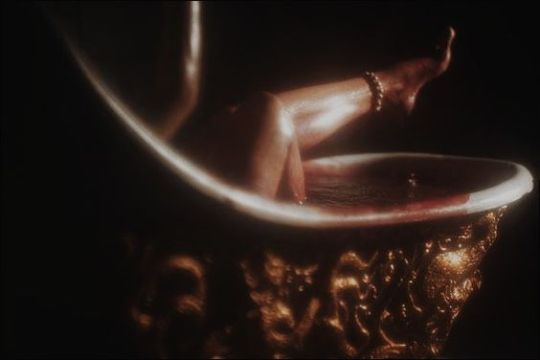
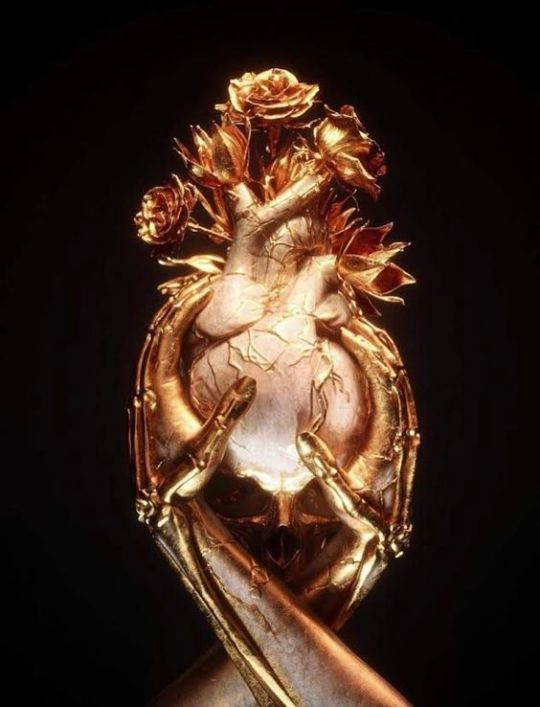
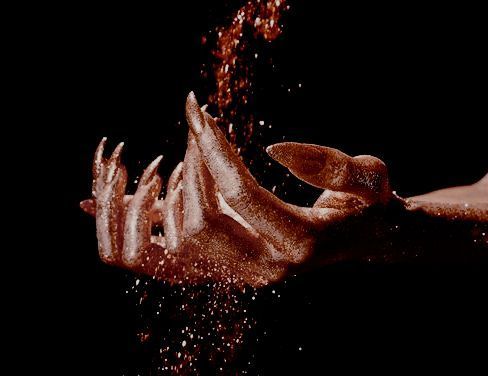
Glass House Ateez x reader
Everything changed in an instant.
The king was dead, and thousands of dragons took to the burning skies. The old world was over, and a 'new age' was in the making—an age of gods and monsters.
A thousand years ago, the fires of revolution blazed across the face of the world. Dragons—the creatures of ancient legends and children's fairy tales—reduced the once prosperous world to ashes in a matter of minutes. Rivers of black blood coursed through the veins of the streets, flooding the cities and lands in their wake. The sky was a blaze of purple flames and electric shocks. The church was reduced to rubble, and the royal family was executed in a public display. In the eyes of the dead, the unspoken horror in front of these majestic creatures remained forever, and in the sparks of the flames, they shimmered like precious sea stones.
There was a bitter smell of burning flesh and ash in the air. It was the smell of dreams on fire—the smell of a future in decay.
It was the beginning of the end of ancient life. The beginning of a new world. The Age of Immortality has begun.
All the legends turned out to be true; dragons did exist. They had always lived close to us, lurking in the velvety darkness of the night, waiting for the hour. Waiting for the hour to come when the power would be in their hands. Dangerous, unbridled, wild creatures of magic and the elements, predators at the top of the food chain. They had come into the world to rule, not to obey, and now, at long last, their time had come.
The world was at anarchy. Dragons were killing, raping, and enslaving races and lands as if it were an amusing child's game. They drank blood as black as the night from golden bowls, and they ate our succulent flesh as our bones cracked under the pressure of their razor-sharp teeth. They would hold orgies in the midst of the torn corpses and revel in their omnipotence. Those were the days of darkness. A time of terror, when the very word danger was a synonym for life itself. And so it went for several years, until the ultimate power fell into the clutches of the deadly Children of the Night, the oldest of all dragons.
The majestic Hala.
Eternal as the moon itself and deadly as the uncharted depths of the ocean, they inspired burning terror in all who encountered them. To their people, they were nothing more than a myth, a legend written on fragments of tablets. Forefathers, ancestors—they had hundreds of names, but each one inspired more fear than the last. They were predators among predators, bristling with animal dominance and primal, unbridled sexuality. They exuded power and sinfulness. They were the ones who defined the rules and set the boundaries of what was permissible.
With the arrival of Hala, a new phase in the history of the world began.
Humanity was enslaved, and dragons became the dominant species. As the years went by, the human population began to decline rapidly, with fewer and fewer humans, until "our" species reached the status of gatherers. Angelicus Nova, or Angel Stars, was what we came to be called. Human existence took on a strange religious orientation; we were worshipped, idolized, and adored, but despite all this, humans remained nothing more than a rare exchangeable currency, nothing more than an expensive trinket that was prestigious to own and could be broken with a flick of the wrist.
The human being also became one of the ways in which money flowed endlessly. These institutions were known as "glass houses." Gateway to heaven. They would be the equivalent of strip clubs or luxury escort houses if you and I were in the old world. The rules were the same: "Look, but don't touch." Girls and boys were expensive pieces of family jewelry that rested under the glass of fancy display cases. Our masters showed us off to the greedy eyes of the world with all the pride and ostentation that dragons have.
In spite of their possessive, animalistic nature, dragons were nothing more than swaggering bastards with inflated egos and delusions of grandeur.
Humans could be anything as long as dragons owned us—a muse, an innamorata, a nymph, an angel, a siren, or even a goddess—but like everything else in the universe, we came at a price.
The 'glass houses' were only in operation at night. During the day, all the 'jewels' rested and tidied up after tiring hours of contemplation of the world through the bluish glass of the display window. Nice, obliging workers in starched white collars were busy with the cleaning, scrubbing the baroque decorations of the vetrines with great care from a mixture of sperm, drool, and other secretions. You looked at it with an almost reverent awe, finding it disgusting to the point of bordering on the pornographically beautiful.
You could see it as real art—crude and original, but art nonetheless. There was something particularly mesmerizing about it, almost hypnotic, about the way the thick, pearly sperm dripped slowly from the golden flowers.
Of all the glass houses that ever existed, "Eros" was the most beautiful. It was the jewel in the crown of the New Empire, and you were its goddess. There were rumors that the Hala themselves were customers of 'Eros'. But rumors were only rumors. If they were ever to visit your 'home', you would know about it, for they would be where all men ended up—at your feet.
You were content with the life that you were living. There was no tragedy and no misery, no abusive family or abusive peers, no bullying and harassment at school—no, you had it all great. You were born here at Eros—the growth and blossoming of a beautiful flower. Your whole life has been within the confines of glass rooms and silk sheets, but unlike your dreamy friends, you weren't in need of rescue.
Your name is Aphrodite. Born in the radiance of the Creator. A goddess among goddesses, carved out of marble and mother of pearl. Your hair falls to the ground in waterfalls of pearls and silk. Your eyes are the eerie silvery moonlight in half-darkness, the deadly attraction of jewels in velvet lashes. Your lips are the succulent, juicy, forbidden fruit that every man would like to taste. The pain of your kiss is going to be the last pleasure of life.
You are not a delicate, pure lily; you are not a passionate, fiery rose; you are a narcissus reveling in the crystal of mountain waters. You love yourself to pain, to death, to despair, and in all the New Empire, there was none more beautiful than you.
Original sin. The primordial beauty. You are desire in all it manifests and begins to manifest.
The naked goddess, clad in snow-white fur like armor, is the goddess of love and ecstasy.
You've never been conceptualized; you've always been enigmatic.
You have been the object of worship. Your beauty has been sung in songs, and your love has been professed in a thousand languages. "Eros" was the site of visits from the mightiest and most powerful dragons of the New Empire. They all crawled at your feet, stroking their thick, greased with their cum cocks, greedily as they burned your skin with their golden gaze. They licked the deceptively thin glass of your display case with their long, sometimes split tongues, leaving muddy streaks on the perfect surface of the glass. The mighty and great dragons, unaccustomed to humiliation and submission, urinated like bitches in heat at the mere sight of your bare shoulders and long neck covered with diamond serpents, their eyes shining like stars in the twilight of your silken chambers. They would drip their sperm onto the icy marble floor until it collected in small, glistening puddles, and then they would lick it up as if it were the sweetest nectar in the world. Ambrosia in the truest sense.
Behind the glass walls of Eros, they were dominators, predators, and the rulers of this world through fear and pain, but here in this garden of Eros, they were nothing more than whores—shameless and needy. Slaves to your beauty, desperate to please you.
Their moans are always a delight to you. The moaning of your name.
The scenarios have been repeated to the point of being painful. Sugar-sweet subs with outstretched tongues and pretty, tear-stained faces. Dominant alphas with sweat-glistening skin and eyes rolling with pleasure.
Dragons fucked other dragons; orgies and bacchanals were staged; they were subjugated and subdued. They growled, moaned, squealed, and purred; some were fucked like a port slut, and some were licked for hours until they passed out from hyperstimulation. Some masturbated in front of your window, enjoying the fact that you were there to watch them, and there were others who would spend their heat and ruts in front of your window.
The list could go on and on: bondage, darkphilia, breeding, voyeurism, humiliation, objectification, and breathing games.
You were saturated with this game.
There were so many ways in which you could spend your evenings in the company of others. It was all designed to excite you, to make you beg, and to make you plead. Each of your visitors secretly hoped that one day you would strip off your luxurious furs and assume the position that was right for them—submissive, naked, and ready to accept whatever it was they were giving you.
It was an act of power; it was a position of strength, but here you were the strength. You were power.
No one would ever have the temerity to lay a hand on you. Goddesses are always untouchable.
You entertained yourselves by teasing them, mocking them, and fanning their flames of desire and passion. Dragons are creatures that are very dependent on their emotions and their desires; they feed on their power and their magic, but when they do not get what they want, it burns them from the inside; it breaks and crumbles them, like a cookie that has been bitten.
It was delicious, but you were full. Thank you, next.
You never denied that you were a sadist; you had a taste for pain; maybe it was a kind of revenge for the destruction of your family; maybe not. They came to you for that feeling; the dragons wanted to be punished and tamed, and the feeling of pain made them cum harder. As they say, Orgasm is a little death.
You could play this game for hours on end, letting the fur expose your boobs and pressing it against the cold glass as you went. It was magnificent—tall and plump, as if it had been milked with milk—with pink nipples the color of magnolia blossoms. There was something animalistically seductive about it—an appeal to their natural reproductive instincts—that evil thought of possible pregnancy. Their whimpering made you laugh, and the sounds they made were so sweet—desperate pleas and long, long moans.
"Let me taste you; I want it so much. I was a good boy, such a good boy."
There were other days when you would let your hands run over the bare skin of your thighs, leaving long red streaks that stood in erotic contrast to the silk of your pale skin. You smeared the clear, shimmering liquid of your juices along the line of your neck, in that most exciting place for dragons, where their teeth locked in a mating mark, as if branding their mate in the most perverse of affiliations.
"Tell me I belong to you; please say it. I'll do anything you don't want. Own me, use me; I want to be your toy.".
Sometimes other girls would be brought into your shop window to put on an erotic show. Exquisite nymphs and rosy-cheeked Lolitas would explore your tender skin with their soft, wet tongues, leaving traces of hungry kisses, until at last their lips would close on the most intimate spot between your thighs.
On days like this, the whole of 'Eros' would shake with furious, jealous growls and thunderclaps. Dragons were terrible possessive, and even though the "scene" itself would excite the hell out of them, the jealousy would burn through their veins from the inside out, like a deadly poison.
"You belong to me, and only to me. You are mine, mine and mine alone. I will tear this girl apart, and we will fuck in her blood until there are no more conscious thoughts left in your pretty little head, until you remember nothing but my name.".
But no matter what their words were to you, you didn't have a care in the world. Nobody would dare touch the goddess, and if they tried, they would not only lose their hands but also get killed.
That was the law of the New Empire—all the people who were left were protected and sheltered in an incredible way. There were very few of you, and if there had been any harm to even one of you, it would have been a real tragedy.
Only once has there been a breach of that law, and the consequences have been terrible. No one wants a repeat.
In any case, your life in the Garden of Eros was a pleasure. Maybe it was some kind of perverse way of looking at the world and love, but you didn't have any desire to change anything; everything was great.
Have you ever wondered if there might be another version of you out there? Perhaps, somewhere in a parallel universe, humans would still exist as the dominant species, their countries and cities would be prosperous, and you would be living a different life—a normal one. There, in that other universe, that other Aphrodite—no, not Aphrodite—you would have an ordinary name, not a divine one, something cute, something sweet, and always with a hint of shyness. It is probably there that you would have experienced your first love, that you would dream of a prince who would take you off into the sunset, and that "and they lived happily ever after." You would have been embarrassed to talk about sex, and you would have blushed horribly if his fingers had been in your knickers. But you weren't her. And she wasn't you. You don't want to be saved from sinning; you want to become one of them. You want to experience forbidden pleasures. You want to subjugate and dominate.
You're not in need of a prince; you've already had a king, or rather, eight kings. The day will come when everything you have ever dreamed of will come true, even if you haven't met any of the Hala yet.
You want power; you want to sit on a golden throne in a castle high up in the sky, and so it shall be. They say that love is a great strength, but they fail to mention that it is also the greatest weakness. And you, like no one else, know how to use it to your advantage.
This is not a pink fairy tale. There are no rainbow ponies pooping rainbows and eating fairy dust. No, this is a rotten world. It is full of debauchery, violence, and sex. You could say, "Come and rescue me. I'm waiting for you," but no, you have to rephrase it as "I'm waiting for you to crawl on your knees and lick my heels, and from that moment on, I will own you.".
Yes, that sounds much better.
It's already eight o'clock; time to get ready; you're leaving soon.
Ladies and gentlemen, welcome to the most famous glass house in the New Empire. Tonight we have wet aesthetic cunnilingus as our main course, and for dessert, a mind-blowing orgasm. You have a choice of starters. Drinks are on the house. We accept cash and checks. If you wish, you can leave a tip for one of our "jewels.".
Our hope is that your time at Eros will be an unforgettable experience.
#ateez smut#kpop smut#ateez x reader#ateez imagines#ateez fanfic#atz smut#smut#seonghwa smut#hongjoong smut#san smut#yunho smut#mingi smut#jongho smut#wooyoung smut#yeosang smut#seonghwa x reader#hongjoong x reader#mingi x reader#san x reader#wooyoung x reader#yunho x reader#jongho x reader#yeosang x reader#ateez unholy hours#park seonghwa smut#ateez fanfiction#ateez scenarios#ateez hard thoughts#ateez hard hours
237 notes
·
View notes
Text


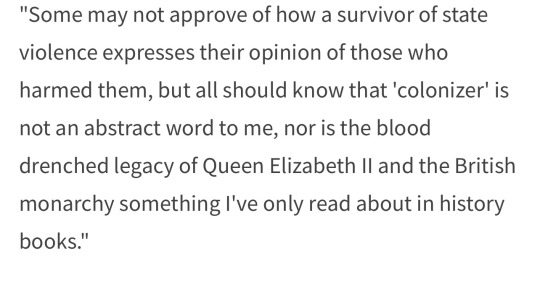
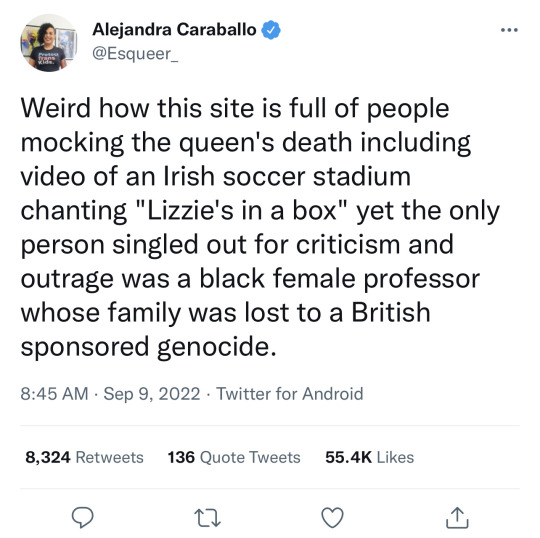
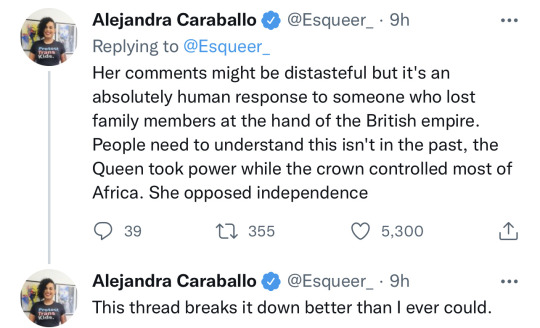


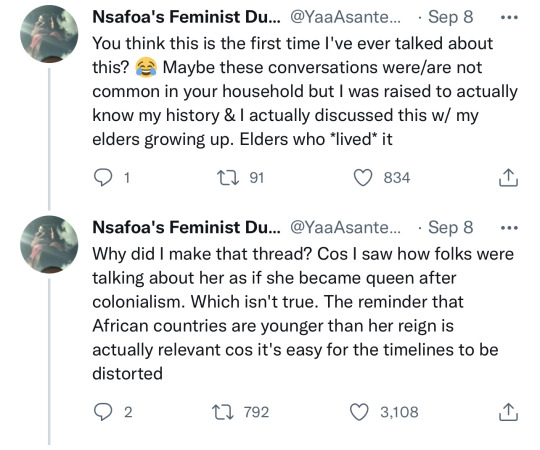
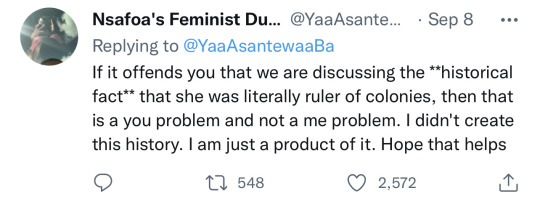

Lmao. Twitter user georgina4781 is like, “I hope future generations judge you by the same social standards” — aka: being against white supremacy, Apartheid & imperialism that destroyed the lives of literally MILLIONS of Black and indigenous peoples. And they said that shit with their whole entire chest out! You and your pesky “modern standards” of …. *checks notes* …. not enslaving entire countries and depleting said countries of valuable material resources.
Look, Imma let everyone in on a little secret here: throwing down the, “BUT THEY DIDN’T KNOW ANY BETTER BACK THEN” excuse is 💯bullshit. But white people can be counted on to stay eating it up. Because that false framing serves a purpose.
Are we really and truly expected to believe that absolutely noooobody back then had any inkling that things like slavery, colonialism and Apartheid were evil? Nobody at all back then knew it? C’mon now. See? More “white innocence” bullshit. You think Jeff Bezos doesn’t know that people dying in Amazon warehouses is easily preventable and him not taking precautions to avoid more deaths is “bad”? People know wrong now, and they knew it back then. Still not sold? Okay, how about this: if nothing else, the Black and indigenous people being colonized knew it and expressed their views, but colonizers intentionally ignored them and did not listen to them. And I’m pretty sure we won’t need to search very hard through history books to find white people who knew it was wrong too. Just because their voices did not prevail doesn’t mean that “everyone back then” somehow did not know better. Many knew better and simply did. not. care. Kinda like Jeff Bezos right now.
When we accept the false premise that “they just didn’t know any better back then,” we are allowing a form of whitewashing history to happen — we are allowing today’s racism deniers to deftly delete the agency of colonizers, and replace their cruelty and greed, with innocence. And POOF! Just like that, the myth of white innocence is maintained, and the cruelty and greed behind all imperialism is parsed, equivocated and whitewashed away into something less heinous and more palatable.
And the thing white people seem to call “bringing up the shitty parts of history” is literally what everyone else, under ordinary circumstances, refers to as the truth, but apparently everyone is supposed to stay quiet so that colonizers and their beneficiaries can continue whitewashing history and continue pretending that it wasn’t really that bad, or advise everyone to just “get over it” because was “a long time ago,” or eventually argue that it never happened at all.
I’ll let you in on another secret: white people who want to downplay & deny racism love to throw racism into this far away safe space called, “the past”. I’m reminded of an old saying that goes something like, “your grandfather may have chopped down the tree, but we are still suffering from no shade today because of his actions.” An incredibly bad paraphrase on my part, but the point is, Uju Anya is a survivor of war and genocide caused by recent colonialism, and the person who was instrumental in that - in chopping down the proverbial shadetree - just died. Uju Anya is still experiencing the loss of diaspora caused by Queen Elizabeth’s kingdom, and telling her how to process her very real and very current grief is so presumptuous that I would need to live a million years as a white person to even begin to comprehend how presumptuous that is.
White fragility is a hell of a thing. But demanding that the still-living and still-impacted descendants of imperialism just shut up so that European whites don’t have to be reminded of their queen’s active role in colonialism … that’s strait up bullshit.
Apparently American conservatives aren’t the only ones upset with honestly talking about theories critical of racist systems.
Sending out much love to Uju Anya, who is now having Jeff fucking Bezos, one of the richest white men in history, and others harass her and lecture her about “kindness” and “respectability politics”.
#politics#uju anya#queen elizabeth#white fragility#whitewashing history#revisionist history#imperialism#colonialism
2K notes
·
View notes
Text

Biddy Bridget Mason (1815-1891) was born into slavery and "given" as a wedding gift to a Mormon couple in Mississippi named Robert and Rebecca Smith. In 1847 at age 32, Biddy was forced to walk from Mississippi to Utah tending to the cattle behind her master’s 300-wagon caravan.
After 4 years in Salt Lake City, Smith took the group to a new Mormon settlement in San Bernardino, California in search of gold. Biddy Mason soon discovered that the California State Constitution made slavery illegal, and that her master's had a plan to move them all to Texas to avoid freeing them.
With the help of some freed Blacks, she and the other Slaves attempted to run away to LA, but they were intercepted by Smith and brought back.
Biddy had Robert brought into court on a writ of habeas corpus. She, her daughters, and the ten other Slaves were held in jail for their own safety to protect them from an angry and violent pro-slavery mob until the Judge heard the case and granted their freedom.
Now free, Mason and her three daughters moved to Los Angeles where they worked and saved enough money to buy a house. Biddy was employed as a Nurse, Midwife, and Domestic Servant.
She used part of her land as a temporary resting place for horses and carriages, and people visiting town paid money in exchange for the space. That particular area was considered the first "parking lot" in Los Angeles.
Biddy began a philanthropic career by opening her home to the poor, hungry, and homeless. Through hard work, saving, and investing carefully, she was able to purchase large amounts of real estate to help build schools, hospitals, and churches.
Her financial fortunes continued to increase until she accumulated a fortune of almost $300,000. In today's money, $6M. Her most noted accomplishment is the founding of the First AME Church in California.
I love the stories of the enslaved that work for their freedom and beat the oppressive system to become successful.
110 notes
·
View notes
Text
[“People benefit from poverty in all kinds of ways. It’s the plainest social fact there is, and yet when you put it like this, the air becomes charged. You feel rude bringing it up. People shift in their chairs, and some respond by trying to quiet you the way mothers try to shush small children in public when they point out something that everyone sees but pretends not to—a man with one eye, a dog urinating on a car—or the way serious grown-ups shush young people when they offer blanket critiques of capitalism that, with the brutal clarity of a brick through glass, express a deep moral truth. People accuse you of inciting class warfare when you’re merely pointing out the obvious.
As a theory of poverty, exploitation elicits a muddled response, causing us to think of course and but, no in the same instant. On the one hand, as the late composer Stephen Sondheim once wrote, “The history of the world, my sweet—is who gets eaten and who gets to eat.” Clans, families, tribes, and nation-states collide, and one side is annihilated or enslaved or colonized or dispossessed to enrich the other. One side ascends to a higher place on the backs of the vanquished. Why should we think of poverty today as the result of anything different?
On the other hand, that was then. Notice how our voices, which can so effortlessly discuss exploitation that happened in the past, become garbled and halting when the conversation moves to how we get over on each other today. Perhaps because exploitation appears to us only in its most galling, extreme forms: enslaved Black field hands, young boys sent into the coal pits and young girls into the cotton mills. Perhaps we are captivated by a heroic narrative of progress, particularly racial progress, as if history, to quote the psychologist Jennifer Richeson, was “a ratchet that turns in one direction only.” Or perhaps we connect the concept of exploitation with socialism and don’t want to be associated with its tenets (or at least not its aesthetics). Years ago, I presented a paper titled “Exploiting the Inner City” at Harvard’s Kennedy School of Government, a paper that documented the business strategies of landlords in poor neighborhoods. The paper was straightforward. It showed how some landlords make a living (and sometimes a killing) by renting shabby housing to very poor families. After my talk, a senior scholar looked rather alarmed. “You’re going down a Marxist path,” she said. “You know that, right?”]
matthew desmond, from poverty: by america, 2023
300 notes
·
View notes
Text
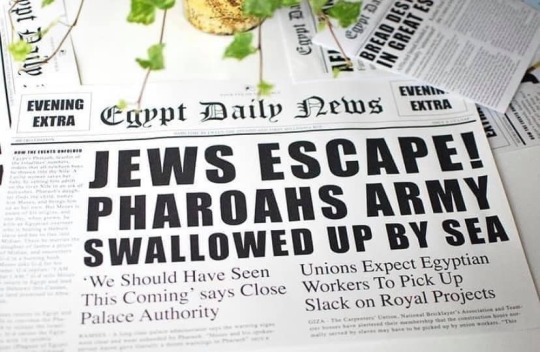
“You know,” Rev. Martin Luther King Jr. intoned from a podium in Memphis April 3rd, 1968, the night before he was killed, “whenever Pharaoh wanted to prolong the period of slavery in Egypt, he had a favorite, favorite formula of doing it. What was that? He kept the slaves fighting among themselves. But whenever the slaves get together, something happens in Pharaoh’s court, and he cannot hold the slaves in slavery. When the slaves get together, that’s the beginning of getting out of slavery. Now let us maintain unity.”
I’ve always wondered why MLK employed a biblical oratory that fateful night, a story that is Jewish and over 3000 years old. I’m sure there are wonderful quotes of black historical figures he could have used. Why use the Jewish story?
Our slavery in Egypt 3,336 years ago was the first time in recorded history that a nation enslaved another nation. Never before were an entire people slaves. We proved to the world that a nation can be enslaved and freed in a single generation. Since then, nations who have enslaved have looked at our story for inspiration and hope. We did it and so can they.
This year, when we sit around the Seder table and recall our people’s struggle for freedom it’s just as real and apparent as it was then.
Today, the fallacies that divide us are dissipating and there are so many more reasons to be united. In the words of MLK, let us maintain unity.
Rabbi Yisroel Bernath
67 notes
·
View notes
Note
As a black person I actually find the logic of many Zionists to be audacious.
My people were sold and kidnapped. We were enslaved for hundreds of years. We had the most despicable things happen to us. I’m sure you may relate, we were put into breeding camps, they used our parts to make clothes and furniture, allegedly they ate us, they tortured us, etc.
There is more than enough proof I am indigenous to Africa hell I found and reconnected with the family one of my ancestors was taken from. I am very lucky.
At no point have I ever thought about going to West Africa and taking the land back, stealing property, imprisoning, and murdering people who’ve lived there for centuries and still live there today. Even though there’s a possibility that they’ve participated in the selling of at least one of my ancestors.
Just because I can trace my heritage there doesn’t suddenly mean I have a claim on the land. I have heard so many Zionist say they belong there more than Palestinians, that there claim on the land is stronger. Maybe it’s not all of them but it is enough to be concerning.
Also bring up Liberia if you want. We didn’t ask for that.
This is a fair critique and it brings up one of the most important aspects of Zionism, and of all Jewish life in the modern era and from now on: that Zionism was always morally RIGHT, but it did not have to be morally NECESSARY.
For decades there was a raging, controversial, legitimately two-sided intracommunity debate over Zionism, like nothing you see among Jews today, memorably portrayed in Chaim Potok's novel "The Chosen" (and subsequent film version). The Reform Jewish Movement, our largest denomination, was governed by an explicitly anti-Zionist platform for over 50 years..... until they changed their minds in 1937. The Jewish people always trace their heritage to Eretz Yisrael, always could claim a rightful place there - but things should never have been allowed to get bad enough, fast enough, that in the truest sense their only choice was to create a state of Israel or die.
As early as 1920, Hitler said his goal was total extermination of the Jews. Nobody cared. America sealed its gates to Jewish immigrants in 1924. Germany began visibly prepping for genocide around 1935, again nobody cared. At Evian 1938 - "the great betrayal" - pretty much every powerful state in the world acknowledged that the Jews were about to be wiped out, and knowing that, refused to allow refugees to enter (except for the Dominican Republic, the mensches). England bowed to Arab terrorism and sealed off immigration to Mandate Palestine - which was a violation of international law under the League of Nations but, again, nobody cared. Nobody, not one single country, fought to protect the Jews or to help them escape. The Allies couldn't be bothered to bomb the tracks into Auschwitz, but they would heroically sink refugee ships. After the war, 250,000 Jews lingered miserably in displaced persons camps for YEARS, with not one single country being willing to admit them, and in nearly all cases there being nothing to return to anyway. There were still Jews kept in Dachau, guarded by Germans, until 1951.
From a 1945 report to Truman: "Many Jewish displaced persons … are living under guard behind barbed-wire fences … including some of the most notorious concentration camps … had no clothing other than their concentration camp garb…. Most of them have been separated three, four or five years and they cannot understand why the liberators should not have undertaken immediately the organized effort to re-unite family groups…. Many of the buildings … are clearly unfit for winter…. [Author contrasted these conditions with the relative normal life led by the nearby German populations and wondered at the contrast] ...We appear to be treating the Jews as the Nazis treated them except that we do not exterminate them. They are in concentration camps in large numbers under our military guard instead of S.S. troops. One is led to wonder whether the German people, seeing this, are not supposing that we are following or at least condoning Nazi policy...."
Those who attempted to return to their former communities were routinely murdered (seen at the end of "Maus"). There was a massacre of Holocaust survivors in Kiev, Ukraine in September 1945, another in Kielce, Poland in July 1946.
The Jews saw Palestine as their only hope, because it was. And when they saw their enemies there were led by actual red-handed Nazi war criminals, and heard that the stakes were once again their total genocide? Well, that's when you fight.... damn hard... to build the state and the military that will, FOR ONCE, protect you.
You talk about "At no point in my life have I considered claiming a part of Africa and fighting the people who I find there". Well - what if it was extremely obviously that or death?
A popular saying among Jews: "Israel was not created because there was a Holocaust. The Holocaust was created because there was no Israel." It's true - but it should not have been necessary to have an Israel to prevent the Holocaust. The rest of the world should have done that, and they didn't so much fail in preventing it as much as they succeeded in enabling it. You are correct to say that African-Americans did not ask for Liberia. The concept was made up by white people to try to get blacks out of America (though it gained popularity with black people after "milestones" of new cruelty such as the passage of the Fugitive Slave Act, and I believe Marcus Garvey is well-liked to this day). Well, Jews did not ask to have no government in the world grant us equality or defend us from genocide. We did not ask to have no choice. And we do not ask for our response to the latest attempted genocide to be condemned by the same nations that enabled the last several.
Today about 90% of Jews are Zionists. Not just out of the everlasting moral principle, but because of the life-or-death reality that when we needed ANY OTHER OPTION TO WORK, NOTHING DID. And since then, there has been even clearer demonstration of the tenuousness of Jewish survival and the depths of inhuman hatred we face from our enemies, as the 3,000-year-old Mizrahi Jewish civilization was successfully uprooted and purged from dozens of countries (which had already been oppressing and massacring them long before Zionism) as collective racial revenge against Israel. The mere fact that that was logistically possible - that it could be done, quickly and repeatedly - speaks worlds about the normalized culture of eliminationism surrounding us. What do you really think are the chances that African-Americans could be altogether physically purged from the USA or some of its states? Yemen, Syria, Afghanistan, and Eritrea finished their Jews within the last 5 years.
As "critics of Israel" have made it extremely clear that all Jews worldwide remain legitimate targets, that all "colonizers" (unquestionably including Americans like me) "deserve it" ("it" to include infanticide, rape, kidnapping, and mass murder), and as America visibly decays into algorithmic racist authoritarianism and climatic desperation.... you should not expect that 90% to change.
177 notes
·
View notes
Note
WIBTA for trying to find information on the descendents of people who were enslaved by my ancestors?
I (30, M) am from a mostly white family and was doing some genealogy digging. I found one branch of my direct ancestral family who lived in the USA and owned several Black slaves- they were mentioned in a will by first names, there were maybe 4 or 5 people. Maybe it's sympathy, white guilt or selfish, morbid curiosity, but I want to know if those people survived- what happened to them, how their families (if there are any) are now. I know the city where they would have lived, and checking records there would be a good start.
On one hand, I feel like more white people should take accountability and learn about their specific family misdeeds. I don't have much of anything to my name, but who knows? Maybe in some small way I could make their life better. It doesn't fix anything but avoiding it is cowardly and smacks of people who pretend white supremacy is "fixed now."
On the other hand, "hey, your great great great great grandparents were enslaved by mine and I dug through their records to find you and let you know I think that was fucked up" feels like an absolutely insane sentiment to hear. And doing something like anonymously keeping tabs on a family is creepy. It's not like there are any estates to sue- at least that we ever knew about.
I also know from my friends that are Black that a lot of questions go unanswered when it comes to family history, and that not knowing and having to assume can be traumatic too.
At the end of the day I just want to know if they have any living relatives today, if I can even find out what happened to them after slavery. WIBTA for this?
What are these acronyms?
107 notes
·
View notes
Text


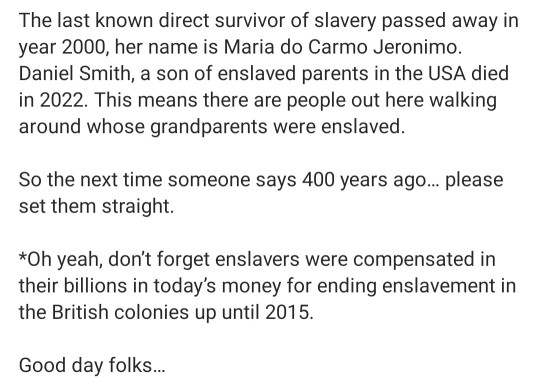


and slavery was never abolished in america. the criteria was moved to prison and once that happened white people starting making up laws and policies to jail black people and enslave them again. black codes is just one example (see also). today the prison industrial complex still feeds on black bodies and makes BILLIONS for a select few and for the country. BILLIONS. slavery is still here. just modified.
231 notes
·
View notes
Text
instagram
#blacklove#energy work#fatherhood#love self#parenting#lovesexrelationships#self love#i love it#protect black women#meditation#protect black people#protect black men#protect black girls#protect black children#modern day slavery#enslaving black people today#Instagram
0 notes
Text
Today we venerate Ancestor & Hoodoo Saint Nat Turner on his 223rd birthday 🎉
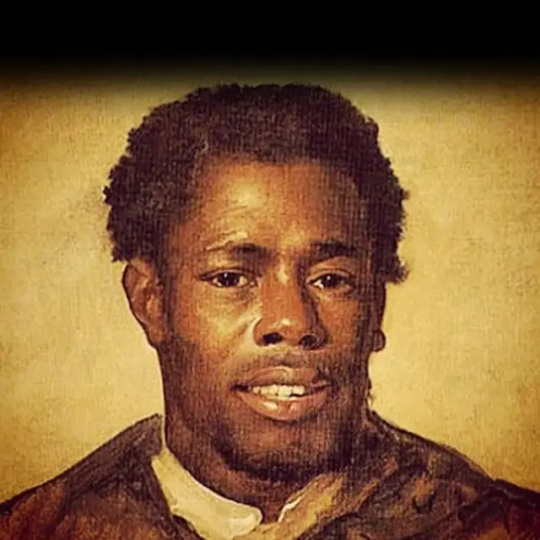
King Nat was a Seer, prophet, preacher, & Freedom Fighter who used his intuitive gifts to spearhead one of the greatest slave rebellions in U.S. History; one that would shift the trajectory of Black lives under Maafa for decades to come.
King Nat was born enslaved on the Benjamin Turner plantation in Southampton Co., VA. He was a highly intuitive and gifted child. He could easily recall events that took place in his life as early as 3 or 4 years old. He also foretold of events that occurred before his time. His grandmother was a deeply spiritual elder and nurtured his spiritual development. His mother and many of those enslaved on the Turner plantation knew that he would become a prophet & was surely destined for a higher purpose.
For his "uncommon intelligence ", Nat learned to read & write at a young age at which time he was also indoctrinated into Christianity. His interpretation of the Christian bible convinced him that the Christian God condemned Slavery. This inspired him to become a preacher.
By age 21, King Nat was a prolific Seer & was known as, "The Prophet". Nat received many visions & Divine messages over the course of his life. Much of which guided him to avenge slavery & free our peoples from bondage. He had a series of 3 visions that would set him on course to fulfilling his highest purpose, thus forever impressing his name upon in U.S. history.
The 1st vision came as he was following in his father's footsteps, fleeing the plantation. To everyone's astonishment he returned of his own volition after spending 30 days in the woods because, “the Spirit appeared to [him] and said [he] had [his] wishes directed to the things of this world, and not to the kingdom of heaven, and that [he] should return to the service of [his] earthly master.” One year later, the devil died.
On May 12, 1828, Nat he received a 2nd vision, as he witnessed a solar eclipse. He “heard a loud noise in the heavens, and the Spirit instantly appeared to me and said the serpent was loosened, and Christ had laid down the yoke he had borne for the sins of men, and that I should take it on and fight against the serpent, for the time was fast approaching when the first should be last and the last should be first.” This, he believed to be the sign he had been promised.
On, August 13th 1831, Spirit delivered a 3rd message; in the form of lights across the night sky. At which time, an atmospheric disturbance across the sky in the aftermath of an eruption at Mount St. Helen's (3,000 mi away) caused the Sun to appear bluish-green in color. Nat prayed to learn their meaning. For Nat, this reaffirmed the work that he'd been called to do; to move forward with his mission to avenge Slavery & free those he could. From then on his plans were set into motion.
At 2am on August 22nd, King Nat led his peers & allies into rebellion. They struck their slaver's household first; slaughtering the entire family. From there they went from house to house, killing every single devil in their path. By noon, they marched toward the neighboring town of Jerusalem where a White militia of 3,000 men lie in wait for them.
Most of the rebels were either captured or killed - except for Nat. He managed to escape & eluded Virginian authorities for 2mo. He hid in the woods just miles from his former slaver's plantation. He was discovered on October 30th by an armed farmer who stumbled across him hiding in a foxhole. Emaciated and weak, he surrendered willingly. After his arrest, Turner was taken back to Jerusalem where he stood trial & was convicted, then sentenced to death by hanging. Nat was killed on November 11th.
To our deepest disdain & no suprise, he was denied a formal burial. Instead, his body was taken to doctors for dissection, to be distributed among affluent White families. He was skinned to make their purses. His flesh was turned into grease. And his bones were divided up into trophies. These became heirloom souvenirs to be passereceive among these affluent White families for generations.
Although King Nat did not end slavery as he had hoped, he & his allies avenged those who wronged them, and they did, ultimately, achieve their freedom from this world. Nat became immortalized as a symbol; of warrior strength (for us) & a catalyst of White fear. King Nat single-handedly shook the institution of Slavert at its core. So much that it stretched the divide between Pro-Slavers & Abolitionists. Pro-slavery advocates began calling for greater restrictions on "Freefolk" & demanded that Abolitionists cease their interference with Slavery. In Virginia, politicians saw Nat's intelligence & education as a major threat, thus outlawing the practice of teaching enslaved Peoples how to read or write. Abolitionists' efforts to end Slavery only intensified. This set the stage in U.S politics for the Civil War.
"I had a vision - and I saw white spirits and black spirits engaged in battle, and the sun was darkened - the thunder rolled in the Heavens, and blood flowed in streams - and I heard a voice saying, 'Such is your luck, such are you called to see, and let it come rough or smooth, you must surely bear it." - Nat Turner; "Confessions of Nat Turner".
Let us remember that it was more than bravery, nerve, & standing ten toes down that drove King Nat's rebellion to success. It was, first and foremost, leading with Spirit & trusting in our intuitive/Ancestral gifts.
We pour libations & give him💐 today as we celebrate him for his gifts, Divine trust, bravery, and sacrifice. May we lift him up in prayer & offering in gratitude & lace toward his elevation.
Offering suggestions: prayers toward his healing/elevation, a Methodist bible, libations of water - especially on the battlegrounds of rebellion in Courtland, VA/Benjamin Turner plantation/, read & share his confessions
‼️Note: offering suggestions are just that & strictly for veneration purposes only. Never attempt to conjure up any spirit or entity without proper divination/Mediumship counsel.‼️
#the hoodoo calendar#hoodoo#hoodoos#atr#atrs#ancestor veneration#nat turner#Nat Turner day#hoodoo heritage month
154 notes
·
View notes
Note
Colonialism is a disease
Imagine being an Arab Muslim and having the audacity to call someone else a colonizer. The illustration below is a snapshot of Islamic colonialism and occupation of other people's lands, from the 7th-9th centuries. Islam went on to attack, destroy, occupy and colonize vast swaths of Europe and southeast Asia, as well as what is now called Turkey.
The world has witnessed many colonial empires since the beginning of time. Most notably, the Mongols, Persians, Greeks, Romans, Babylonians, Egyptians, Islam/Ottomans, Portuguese, Dutch, French, Spanish, British, and American. The only empire that didn't take land, even after winning world wars, were the Americans. They actually gave back the Philippines. But I digress.
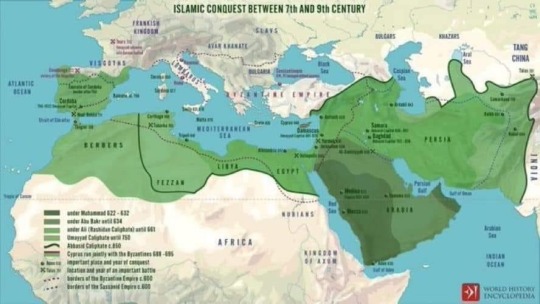
All of these empires were in large part, created by bloody conquest, and built on the backs of the newly subjugated. The Hebrews were, famously, slaves in Egypt.
No one seems to teach this in the west, focusing more on the Romans, but of all the colonialists, one of the most deadly brutal and expansionist empires were the Muslims aka the Islamists. The Islamic empire expanded by sheer, from Medina (where Muhammad massacred and enslaved the 50% majority Jewish population) all the way into western North Africa, much of Europe, and large populations of Southeast Asia (Indonesia, Malaysia, parts of India now called Pakistan, etc).
As it expanded using violence and fear, Islam literally took 100 million slaves out of Africa, and was responsible for one of the greatest mass murders in history: killing 10 million (or more) on the forced march from their homelands to the Middle East.
Some examples of Islamic slavery include the Al-Andalus slave trade, the Trans-Saharan slave trade, the Indian Ocean slave trade, the Comoros slave trade, the Zanzibar slave trade, the Red Sea slave trade, the Barbary slave trade, the Ottoman slave trade, the Black Sea slave trade, the Bukhara (Uzbekistan) slave trade, and the Khivan slave trade from which Islam took millions of slaves out of Persia to the Islamic khanates. There are Arab/Islamic societies today (Libya, a well-known example) that still trade slaves.
Compare this to Israel. Israel/Judea was never colonial nor expansionist. The Hebrews (aka Jews) were often properties of and were subjugated by, colonial empires, including the Islamic colonial empire.
They Hebrews themselves, as noted above, were most famously slaves of the the colonial Egyptian empire, some 4,000 years ago, before being murdered and subjugated by Islam starting in the 7th century. Somehow able to escape Egyptian tyranny through their own efforts (some say, by the grace of Hashem), the Hebrews settled in their current indigenous homeland 3.600 years ago - a small area by global standards, smaller than Belize, Albania, or Montenegro. They were happy there, and even at their peak, did not attempt to force convert others or expand much beyond their lands.
As historian Barbara Tuchman wrote, Israel is “the only nation in the world that is governing itself in the same territory, under the same name, and with the same religion and same language as it did 3,000 years ago.” Despite all the occupations and forced exiles, the Jews/Hebrews/Israelites have maintained a continuous presence in Judea/Israel/Samaria for some 3,600+ years. And even though Israel was granted modern statehood in 1948, it is one of the oldest continuously maintained countries in the world.
The 'modern' state of Israel came to fruition post WWII, in 1948; the redefinition of borders and modern statehood after the fall of the big colonials was in no way unusual to Israel. Many country's modern borders came to be defined in the post colonial period (post WWI & WWII). While Israel and Lebanon and Iraq and Iran and Syria and Egypt were all ancient civilizations, dating back thousands of years, modern statehood came in the 20th century: For example, statehood was granted to Egypt in 1922; Saudi Arabia and Iraq in 1932; Lebanon in 1943; Indonesia, South Korea & Vietnam in 1945; Syria & Jordan in 1946; India & Pakistan in 1947; Israel, & Myanmar in 1948; Laos, Libya & Bhutan in 1951; Cambodia in 1953; Morocco, Sudan & Tunisia in 1956; Ghana & Malaysia in 1957; and so on.
The problem is, the tribalism and supremacy of Islam, can't stand that it's once-conquered land is now in the hands of the original owners. Islam believes that once it puts a flag in the sand somewhere, it's theirs.
Oh, and by the way, Andalusia (Spain) is next in Islam's sights.
#islam#colonialism#colonialist#colonizers#israel#secular-jew#jewish#judaism#israeli#jerusalem#diaspora#secular jew#secularjew#Islamic jihad#jihad#Hamas#taliban#Isis#Iran#gaza#Samaria#judea#samaria#judea and samaria#jihadis#hamas#hamas war#iran war#islamists
79 notes
·
View notes
Text
Have seen very little discussion on this website about the situation in Haiti and figured maybe I’d try to start the conversation?
For those who aren’t aware, Haiti is the only country that led a successful slave rebellion which led to the establishment of an independent country, and a day hasn’t passed where they haven’t been punished for it. The country never had a chance to flourish as the west made sure to suck it economically dry and then dip when nothing was left.
This has left the country horrifically unstable in every way possible. However, the last few years, it has been on the brink of collapse due to absolutely no political leadership and as of now, Haiti has completely collapsed. The country is mostly run by gangs all competing for power. There is no where for refugees to escape. The west has completely abandoned any meaningful intervention and it has mostly been South American, Middle Eastern, and African countries who only seem interested in trying to bring peace. But since 2024 has begun, it is a terrifying place to be full of completely innocent people being screwed over by the west for standing up for themselves.
Of course, this is heavily over simplified and I have no personal connection to Haiti. So under the cut, I’m adding much more accurate and insightful information, as well as fundraisers, books, petitions, and Haitian run businesses and social media accounts. As someone who is studying history, it doesn’t take long to realize most nations struggling today have been victimized for wanting autonomy and freedom. From Palestine to Sudan, to DRC to Ukraine, there is so much preventable tragedy. As someone from a country who has historically inflicted these conditions on a lot of these nations, it’s frustrating to feel powerless to the injustice. I truly find the only thing that puts my mind at peace is education and spreading awareness. Don’t let their suffering be in vain.
*please correct me if any of this information is inaccurate*
Basic information:
Wikipedia
HAITI: A Brief History of a Complex Nation
Britannica: History of Haiti
How Haiti Was Forced To Pay Reparations For Freedom
[video] A Super Quick History of Haiti
The Root of Haiti's Misery: Reparations to Enslavers
Timeline: Haiti’s History and Current Crisis, Explained
[video] Why Haiti is in a Constant State of Emergency
A Brief History Of Haiti
The Haitian Revolution and the Hole in French High-School History
[video] How the World Destroyed Haiti
A Timeline of Haiti
Haiti: a history of intervention, occupation and resistance
[video] Fighting for Haiti
How Toussaint L’ouverture Rose from Slavery to Lead the Haitian Revolution
The Disappearing Land : Haiti, History, and the Hemisphere
History of Haiti
A History of United States Policy Towards Haiti
What is the history of foreign interventions in Haiti?
Haitian history and culture: A selection of online resources
Books:
The Black Jacobins: Toussaint l'Ouverture and the San Domingo Revolution
The Haitian Revolution
Silencing the Past
Fault Lines: Views across Haiti's Divide
Awakening the Ashes: An Intellectual History of the Haitian Revolution
Haiti: The Tumultuous History
Written in Blood: The Story of the Haitian People 1492-1971
The Haitians: A Decolonial History
Why the Cocks Fight: Dominicans, Haitians, and the Struggle for Hispaniola
Outrage for Outrage: A History of Colonialism in Haiti and Its Legacy
Avengers of the New World: The Story of the Haitian Revolution
Black Spartacus: The Epic Life of Toussaint Louverture
The Black Republic: African Americans and the Fate of Haiti
The Farming of Bones
The Rainy Season: Haiti Since Duvalier
The Uses of Haiti
The Butterfly’s Way: Voices from the Haitian Dyaspora in the United States
Charities:
*rating of 80+ on charitynavigator*
Hands Helping Haiti
Heartline Haiti
Hope for Haiti
Haiti Outreach
US Foundation for the Children of Haiti
Hands Together for Haitians
Haiti Empowered
Mission of Hope Haiti International
Haitian Health Foundation
Haiti Partners
Haiti Cardiac Alliance
New Life for Haiti
Locally Haiti
Clean Water for Haiti
Meds & Food for Kids
Haitian Roots
Project Medishare for Haiti
Friends of the Children of Haiti
Childrens Nutrition Program of Haiti
Fundraisers
Haiti Crisis Relief Fund
Haiti Emergency Fundraiser
Urgent Need to Complete Our Haitian Adoptions
Desperate Plea to Help Haitian Family
Haiti Food Emergency
Help a Deaf Haitian restore his life in Maryland
Help a friend get her sister & 3 kids out of Haiti
Daniel Jean - Haitian friend relocate to the US
Help Support My Family in Haiti
Support Young Haitian Artists!
Haitian Artists Need Your Help
PLEASE HELP and PRAY for OUR FAMILY IN HAITI
Help My Mother and Brother from HAITI PLEASE
Urgent Help for Marc Henry and his family in Haiti
Help Michaël in Humanitarian and Political Crisis in Haïti
Lycender Chery & Family
Trapped in Port au Prince, Haiti
Help Rosemica have surgery for her tumor!
Help My Family escape from ruthless gangs
Haitian Orphanage School: Classique Mixte du Rivag
Help Support a Hard Working Mother of Two
Haiti Emergency Relief of artist community
Help Save Gabe's Life and get him from Haiti to US
Aid for Haitian Artist Mario and his Granddaughter
Haitian-Owned Businesses
Kreyol Essence
LS Cream Liqueur
Creole Me Up
Caribbrew
Tisaksuk
Fanm Djanm
Makaya Chocolate
Kòmsi Like
Créations Dorées
Aeva Beauty
Levie's Essential Care
Bel Ti Boujique
It’s Seasoned™
Cremas Absalon
Kreyol Pale Creole Konprann
VagEsteem
Bijou Lakay
V.BELLAN
AYITI Gallery
#reblog if you want I think this is so interesting and important though#rae’s rambles#Haiti#haiti crisis#free haiti#signal boost#Sudan#Palestine#free palestine#free congo#free gaza#fundraiser#gofundme#information#politics#Congo#dr congo#ceasefire#fundraising#mutual aid#history#infographic#learning#art#artists on tumblr#all eyes on rafah#all eyes on palestine#all eyes on gaza#education#lol
56 notes
·
View notes
Text
Historical romance with Black woman, without including racism
Anonymous asked:
I write regency romance and I have a female character that I have written as having a mother who is black Antiguan and father who is white British in 1819—he’s a Viscount so they are highly placed. I want their daughter to have a typical romance arc…and that’s it. I don’t plan on making any of her problems about race or even mention it other than describing her as black and a brief backstory on how her parents met. In ignoring this aspect of her—whatever problems might have presented themselves, what conflicted feelings she might have about British white high society in that era—am I wrong? If I am wrong but still don’t want the romance to be about race and class, how to do that in a respectful way?
Or, is it okay to tell the story of romance without race being an issue at all?
Yes, yes, and yes. And it’s not so much about ignoring any racial conflicts in the era. Although, the history and treatment of Black people was not the same in the European regions as it was in the Americas (feel free to do some research, for context).
It’s about whether the issue matters specifically to:
your story
the specific area
your character’s narrative
to those around her, or specifically the people she interacts with, including the lover, his relatives, friends, and so on.
And it’s okay for that answer to be no. You do not need to make racism just * not exist* but rather, not make it a matter for the people in the story. This is the case whether you write a story set in 1819 or 2025!
Black people should be allowed stories, especially with romances, that aren’t about racist conflict and being dehumanized. The regency romance genre lacks Black women protagonists in love, and BIPOC in general. And these Black women and people do not need to only be mixed race or light, either.
Steps to diversify the genre starts with just letting us exist in history without fears of being “historically inaccurate.”
As discussed many times here:
Black people existed (and exist!) in Europe, and not only as enslaved or oppressed people.
Arguments against historical accuracy are usually only served to keep inclusion out, not to bring it in. The same historical accuracy is not called for when including fairies, ogres and dragons in historical settings.
Therefore, if supernatural creatures can exist in this era as upper class and royalty, so can Black people, period. But again, they did! So.
Not including racism doesn’t mean ignoring reality
Now, if one were to write a story about a Black person today and not include any racism, are they somehow doing Black people a disservice by not putting them through traumas and racism they already face on a regular basis? I would say absolutely not. In fact, it’s what I personally go for. Escapism should exist for us too. These heavy-hearted books have their place and can be sought out if desired.
Colorblindness
On the same note, colorblindness is not ideal. You mention that you’ll still describe the characters, which is good. But being Black or another race or ethnicity, but leaving out the anti and ‘isms doesn’t mean you’re removing an essential part of them. A welcome part of representation is to acknowledge their looks, culture, food, languages…aka the things that make them who they are. The narrative doesn’t need to obsess over differences, but simply accept them as natural.
Some people have this fear of race. As if to talk about, mention or even notice race is to be racist. “Black” is a whispered word.
Avoid all talk of “despite of race” or “not seeing race” because that’s
1) simply not true and is
2) another form of racist erasure.
We can see and acknowledge differences between you and me. And they can simply be embraced and accepted, not ignored.
Ways to acknowledge diversity without racism in romance
There are many ways to do this. Here are just some ideas, some vague and some specific.
Describe and mention the character’s looks
Include physical descriptions of your character’s race. Whether you show or tell, you should make it clear that they’re Black, or the given race you’re writing. It doesn’t have to be a big deal for the plot. It should be something that is at least apparent to readers. Without clear indication, the character will likely be seen as white. Book covers help avoid this white-as-default assumption, too.
You can thread descriptions and reminders, short or longer, throughout the story.
Examples
She had rich brown skin and even darker brown eyes. I lost my breath when she tucked her chin, only to bat her heavy lashes my way.
Thick curls spilled around her face, black coils against golden brown skin.
I attribute my looks to my Antiguan roots - dark brown skin, umber eyes, and a small, rounded nose - all traits that I got from my mother.
She tucked a thick coil under her bonnet
Comparisons also work, particularly if the people are not used to seeing people of this race. Now, these comparisons should not be about exalting one race or putting down the other group(s). Pointing out differences does not need to be a battle of what or who is better looking.
More examples
Lance couldn’t keep his eyes off of the beautiful woman stepping off of the boat. Her skin held a warm brown hue. He’d never seen skin this rich in color – all of his friends and neighbors were pale or only slightly tanned from the sun.
She had dark skin, her brown shade much deeper in tone than the other humans he had met so far on his ventures through space.
Her brown skin, black hair and dark eyes contrasted with those of the pale, blonde women in the room.
“I hear the Duke is courting that young Moorish woman.” “The woman’s name is Emilia Watson,” Sarah said, resolutely.
He admired the stark contrast of their skin, brown and white, as they walked hand in hand.
Add culture, not racism
Culture is many, many things. So there’s many ways to show hints of it throughout the story.
Consider things like:
Food
Holidays
Clothing
Religion, beliefs, myths
Language, phrases
Mannerisms, values and habits
Superstitions
Family roles
Traditions and customs
Art
Food
A special mention to food, but perhaps because I’m hungry writing this. Food can be culture, and a very important part of it, I think it’s also an easy and fun way to incorporate it into a story, without needing to mention racism.
Examples
The characters makes her partner or the family a traditional dish. He / they could also share their favorites with her.
She shows him how to make a dish passed down throughout the family.
Something she makes him is so spicy that he runs to find water for relief, which could be a funny and cute moment.
They celebrate a special holiday or tradition by making a meal together.
They visit a market that sells food or produce from her homeland that they try and enjoy.
In summary
Please feel free to write historical romances with BIPOC, minus the racism. I promise that there’s an audience for it!
More reading
Wealthy Black character in historical romance, written by white author
(1800s Western) non-racist White characters interacting with Black and Native people
Historical American Fiction without the Racism
FAQ - “It wouldn’t be historically accurate for my story to include BiPoC.”
Praising Beauty Without Fetishizing PoC
~Mod Colette
P.S. If anyone has some good diverse regency romances with WOC, please drop those recommendations. I’m always trying to find more to read!
2K notes
·
View notes